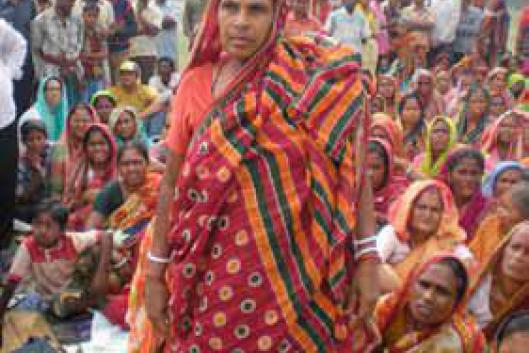(Photo: SSNC)
The negative patterns of land grabbing and intimidation recorded by a Swedish Society for Nature Conservation (SSNC) investigating team in shrimp farming areas around Khulna, Bangladesh clearly affect entire families whose lands and livelihoods have been destroyed.
However, the Bangladeshi civil society organization Nijera Kori and experts in the field of women’s rights maintain that the spread of shrimp aquaculture ponds in the vicinity of Khulna has had a particularly negative impact on women.
Around Khulna, where shrimp farm areas abound, it has been observed that women have become more vulnerable. They are also more likely to be alone, since their husbands are frequently working in cities far away due to the loss of their farmland. In addition, shrimp farm owners often employ men from outside of the local communities to farm and police the shrimp ponds, creating a local demographic imbalance and provoking unease in a tightly knit and traditionally conservative rural village society.
Nijera Kori, which has over 200,000 members, actively opposes the environmental degradation and human rights abuses by the shrimp farming industry. According to the organization, allegations of rape and even kidnap of women are relatively commonplace, but are often difficult to prove. The SSNC research revealed that in the event of an attack or harassment, if a woman should complain, the judiciary is much more likely to side with the male-dominated and pro-shrimp farming elite than the female victim. This situation creates a feeling of hopelessness on the part of women, and a sense of immunity on the part of the men employed by the shrimp farms, who are thus potentially able to carry out harassment and/or violent crimes with a degree of impunity.
While violence against women is widespread throughout Bangladesh, Nijera Kori, based on its work in various coastal areas of the country, maintains that the factors described above have created a situation where women are more likely to be victims of sexual violence when industrial shrimp farming is taking place in their area.
Of the cases documented by the SSNC investigation, allegations of rape are obviously the most extreme abuses towards women. For Sadika Halim, Information Commissioner for Bangladesh and an expert on the rights of women across the country, such testimonies are not isolated, but form part of a broader pattern of abuse across the shrimp sector.
Shrimp industry proponents claim that employment in fry catching, pond clearance and processing-plant production lines provides women with a degree of empowerment through wage-earning potential. But this claim is disputed by the experts and interviewees that the SSNC investigating team spoke with, who maintain that the shrimp industry in Bangladesh frequently undermines the rights and security of women at all stages of the shrimp production process.
According to Sadika Halim, “Several studies on shrimp farming have unearthed evidence that clearly suggests that it is the women and children of shrimp farming communities who suffer the most, socially and economically, as well as through the violation of their human rights, being subjected to various forms of physical violence, including rape and torture.”
Women fry collectors, for example, frequently work for little or no income, often in a relationship of bonded labour with fry traders or “dhadon” to whom they are frequently indebted. And even if they are not employed, it is female members of the household who often have to work harder, because land grabbing by the shrimp farming industry forces them to look for fuel, fresh water and food in faraway places.
Dozens of prawn factories operate in the vicinity of the cities of Khulna and Cox’s Bazaar in Bangladesh. This multitude of companies, often trading numerous brands of shrimp under one roof, derive the bulk of their income through the processing and export of farm-raised shrimp to shellfish brokers, retailers and ultimately consumers in industrialized countries. Around 55% of shrimp raised for export in Bangladesh make their way to the European Union, and 35% to the United States. The rest are largely sold to Japan.
As is the case with most shrimp factories, Sobi Fish Processing Industry and Jalalabad Frozen Foods source their shrimp through a complex network of traders at varying levels around Khulna, and in turn supply many traders around Europe, including Seamark, a vast company with headquarters in the United Kingdom.
Women often fall victim to harassment and prostitution with factory supervisors to help guarantee their jobs in the absence of formal contracts. According to Sadika Halim, it appears that women see shrimp sector employment, whether catching fry, cleaning ponds or working in factories, as the only resort in a “no-choice situation” where opportunities for productive engagements are scarce.Numerous shrimp processing plants surround the river on the outskirts of Khulna. It was impossible for the SSNC team to access these plants, because they are heavily guarded and suspicious of foreign observers. According to research carried out by Sadika Halim, women who work in processing plants where shrimp are prepared for export to the European Union and the United States face intimidation, financial insecurity and health risks. Processing plants frequently employ women with casual labour contracts, a practice that promotes financial insecurity and prevents them from forming unions or other platforms from which they might fight for better standards in the workplace.
“Shrimp production has not only led to economic deprivation and ecological degradation of the coastal areas but has also marginalized the poorest of the poor, who are mostly women,” concludes Halim.
Adapted from the chapter “Shrimp farming from a women’s rights perspective” in the report “Murky Waters: The environmental and social impacts of shrimp farming in Bangladesh and Ecuador”, by the Swedish Society for Nature Conservation (SSNC),http://www.naturskyddsforeningen.se/sites/default/files/dokument-media/murky_waters.pdf
